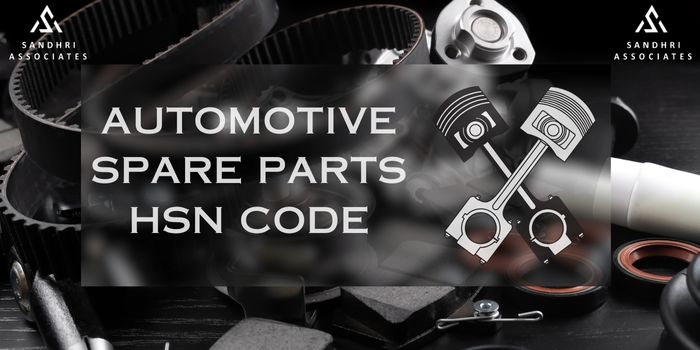Automotive spare parts HSN code plays an important role in the classification and identification of spare parts used in the automotive spare parts industry. The alphanumeric code, recognized internationally, ensures a systematic categorization of products for streamlined trade and taxation purposes.
By assigning unique codes to various automotive components, the spare parts HS code facilitates efficient inventory management enhances supply chain transparency and simplifies cross-border transactions.
Understanding the significance of spare parts HSN codes in the automotive spare parts sector is crucial for businesses to comply with regulatory requirements and optimize their operation in a globally interconnected market.
What Is HSN Code And Why It Is Used?
The Harmonized System of Nomenclature (HSN) provides standardized product codes to classify goods in international trade. These numeric codes from 2 to 10 digits assign each product a unique identifier based on attributes like its nature, composition, and intended use.
By categorizing products consistently, HSN codes aim to streamline global commerce through uniform documentation and tariff determination. This common “language” for product classification facilitates the customs process, reduces ambiguity, and enables smoother cross-border trade. In short HSN codes promote efficiency and clarity in the global market.
Are There Specific HS Codes For Different Types Of Automotive Spare Parts?
Yes, there are specific Automotive spare parts HSN codes for different types of components. The HSN code classifies each spare part based on its characteristics and purpose. For example, engines, brakes, tires, and electrical components each have unique spare parts HS codes, allowing for precise categorization in international trade and standardization identification.
This classification streamlines inventory management, facilitates accurate taxation, and ensures a systematic approach to the wide range of automotive spare parts.
Automotive Spare Parts HS Codes
Here are some major categories and their respective HSN codes which we listed below:
Engine Parts
| S.no | Part Name | Automotive Spare Parts HSN Codes |
| 1 | Piston | 84099120 |
| 2 | Piston Rings | 84099930 |
| 3 | Engine Gaskets | 84841010 |
Electrical Parts
| S.no | Part Name | Spare Parts HSN Codes |
| 1 | Spark Plugs | 85111000 |
| 2 | Ignition coils | 85113000 |
| 3 | Headlights | 85122000 |
Brake System Parts:
| S.no | Part Name | Automotive Spare Parts HSN Codes |
| 1 | Brake Pads | 87083000 |
| 2 | Brake Shoes | 87083000 |
| 3 | Brake Drums | 87083000 |
Suspension Parts:
| S.no | Part Name | Spare Parts HS Codes |
| 1 | Shock Absorbers | 87088000 |
| 2 | Forks | 87141000 |
Transmission Parts
| S.no | Part Name | Automotive Spare Parts HSN Codes |
| 1 | Clutch Plates | 87089300 |
| 2 | Gearbox | 87084000 |
Chassis Parts
| S.no | Part Name | HSN Code |
| 1 | Frames | 87112010 |
| 2 | Handlebars | 87149990 |
Exhaust System Parts
| S.no | Part Name | Spare Parts HS Codes |
| 1 | Mufflers | 87089200 |
| 2 | Exhaust Piper | 87089200 |
Filters
| S.no | Part Name | Automotive Spare Parts HSN Codes |
| 1 | Air Filters | 84213990 |
| 2 | Oil Filters | 84212300 |
| 3 | Fuel Filters | 84212300 |
Tyres and Tubes
| S.no | Part Name | Spare Parts HSN Codes |
| 1 | Tyres | 40114000 |
| 2 | Tubes | 40131000 |
Note: these spare parts HS codes are periodically updated by Indian customs, so verify for the latest codes.
Do OEM And Aftermarket Spare Parts Have Different HSN Codes?
No, OEM (Original Equipment Manufacturer) and aftermarket parts do not have different HSN codes under GST. The HSN code simplifies the applicable GST rate depending on the type of Automotive spare parts and their material composition rather than whether it is OEM or aftermarket.
For example, a brake pad would have the same HSN code of 87083000 no matter if it is manufactured by the original vehicle manufacturer or an aftermarket brand. Similarly, nuts, bolts, spark plugs, filters, etc have identical codes.
Do Different Countries Use Different HSN Codes For Similar Automotive Spare Parts?
Yes, different countries can use different spare parts HS codes for similar automotive spare parts. However, efforts are made to maintain common codes across major countries.
The World Customs Organization (WCO) defines a global harmonized system to standardize trade classifications. Over 200 countries including India follow this system The HS codes have up to 6 digits defined by WCO, while countries add 2-4 more digits as per local trade needs.
For example, an alternator bearing could be classified under HS code 8482 as per WCO guidelines, India would list it under HSN code 84823000. However, the US may classify it under HS 84832010 with some additional digits.

